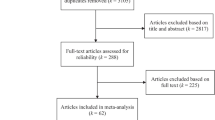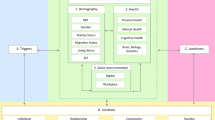Abstract
This study examined the effects of social network characteristics on physical health among people with serious mental illness using social transactions that are reciprocal, and the combination of objective and subjective health measures. The sample consisted of a probability sample of 231 adults with serious mental illness who resided in permanent supportive housing in Philadelphia, Pennsylvania. Path analyses were conducted to examine the relationships between social network characteristics and two aspects of medical comorbidity, objective health and subjective health. Bivariate statistics showed that individuals with medical comorbidity were more likely to have contact with their network members and had a higher level of reciprocal positive tangible support when compared to those who did not have medical comorbidity. The results of the path analyses revealed that none of the social network characteristics were associated with better physical health. The lack of a significant relationship between social networks and better physical health is contrary to prior research findings. However, this is the first study to include both types of social transactions simultaneously as predictors of better physical health for individuals with serious mental illness. A longitudinal study would provide more insight into the temporal relationship of social networks and physical health conditions of people with serious mental illness. Furthermore, the transactional nature of social relationships, particularly for those with mental health issues, requires greater exploration.

Similar content being viewed by others
References
Robson D, Gray R: Serious mental illness and physical health problems: A discussion paper. International Journal of Nursing Studies 44:457–466, 2007
Dickey B, Normand ST, Weiss RD, Drake RE, Azeni H: Medical morbidity, mental illness, and substance use disorders. Psychiatric Services 53:861–867, 2002
Carney CP, Jones LE: Medical comorbidity in women and men with bipolar disorders: A population-based controlled study. Psychosomatic Medicine 68:684–691, 2006
Carney CP, Jones LE, Woolson RF: Medical comorbidity in women and men with schizophrenia. Journal of General Internal Medicine 21:1133–1137, 2004
Lyketsos CG, Dunn G, Kaminsky MJ, Breakey WR: Medical comorbidity in psychiatric inpatients: Relation to clinical outcomes and hospital length of stay. Psychosomatics 43(1):24–30, 2002
Allison DB, Mackell JA, McDonnell DD: The impact of weight gain on quality of life among persons with schizophrenia. Psychiatric Services 54:565–567, 2003
Dixon L, Goldberg R, Lehman A, McNary S: The impact of health status on work, symptoms, and functional outcomes in severe mental illness. The Journal of Nervous and Mental Disease 189:17–23, 2001
Fenn HH, Bauer MS, Alshuler L, Evans DR, Williford WO, Kilbourne AM, et al.: Medical comorbidity and health-related quality of life in bipolar disorder across the adult age span. Journal of Affective Disorders 86:47–60, 2005
Druss BG, Bradford WD, Rosenheck RA, Radford MJ, Krumholz HM: Quality of medical care and excess mortality in older patients with mental disorders. Archives of General Psychiatry 58:565–572, 2001
Hohmann AA: A contextual model for clinical mental health effectiveness research. Mental Health Services Research 1(2):83–91, 1999
Bressi SK: Utilization of physical health services among persons with severe mental illness [Doctoral dissertation]. United States: University of Pennsylvania; 2006.
Berkman LF, Glass T: Social Integration, Social Networks, Social Support, and Health. In: Berkman LF, Kawachi I (Eds) Social Epidemiology. New York, Oxford University Press, pp. 137–173, 2000
Cohen S: Social relationship and health. American Psychologist 59:676–684, 2004
Cropley M, Steptoe A: Social support, life events and physical symptoms: A prospective study of chronic and recent life stress in men and women. Psychology, Health & Medicine 10:317–325, 2005
Fitzpatrick TR, Gitelson RJ, Andereck KL, Mesbur ES: Social support factors and health among a senior center population in Southern Ontario, Canada. Social Work in Health Care 40(3):15–37, 2005
Kahn JH, Hessling RM, Russel D: Social support, health, and well-being among the elderly: What is the role of negative affectivity? Personality and Individual Differences 35:5–17, 2003
O’Reilly P: Methodological issues in social support and social network research. Social Science & Medicine 26:863–873, 1988
Nelson G, Hall GB, Squire D, Walsh-Bowers RT: Social network transactions of psychiatric patients. Social Science & Medicine 34:433–445, 1992
Berkman LF, Glass T, Brissette I, Seeman TE: From social integration to health: Durkheim in the new millennium. Social Science & Medicine 51:843–857, 2000
Wong Y-LI, Filoromo M, Tennille J: From principles to practice: A study of implementation of supported housing for psychiatric consumers. Administration and Policy in Mental Health and Mental Health Services Research 34:13–28, 2007
Wong Y-LI, Nath SB, Solomon P: Group and organizational involvement among persons with psychiatric disabilities in supported housing. The Journal of Behavioral Health Services & Research 34(2):151–67, 2007
Charlson ME, Pompei P, Ales KL, MacKenzie CR: A new method of classifying prognostic comorbidity in longitudinal studies: Development and validation. Journal of Chronic Diseases 40(5):373–383, 1987
Sundararajan V, Hendersona T, Perrya C, Muggivan A, Quan H, Ghali WA: New ICD-10 version of the Charlson Comorbidity Index predicted in-hospital mortality. Journal of Clinical Epidemiology 57:1288–1294, 2004
McGregor JC, Kim PW, Perencevich EN, Bradham DD, Furuno JP, Kaye KS, et al.: Utility of the chronic disease score and Charlson Comorbidity Index as comorbidity measures for use in epidemiologic studies of antibiotic-resistant organisms. American Journal of Epidemiology 161(5):483–493, 2005
Gabriel SE, Crowson CS, O’Fallon WM: A comparison of two comorbidity instruments in Arthritis. Journal of Clinical Epidemiology 52(12):1137–1142, 1999
Earle CC, Burstein HJ, Winer EP, Weeks JC: Quality of non-breast cancer health maintenance among elderly breast cancer survivors. Journal of Clinical Oncology 21(8):1447–1451, 2003
Wildes TM, Augustin KM, Sempek D, Zhang QJ, Vij R, Dipersio JF, et al.: Comorbidities, not age, impact outcomes in autologous stem cell transplant for relapsed non-Hodgkin lymphoma. Biology of Blood and Marrow Transplantation 14(7):840–846, 2008
Hall WH, Ramachandran R, Narayan S, Jani AB, Vijayakumar S: An electronic application for rapidly calculating Charlson comorbidity score. BMC Cancer 4:94, 2004. doi:10.1186/471-2407-4-94
Salyers MP, Bosworth HB, Swanson JW, Lamb-Pagone J, Osher FC: Reliability and validity of the SF-12 health survey among people with severe mental illness. Medical Care 38:1141–1150, 2000
Ware JE, Kosinski M, Turner-Bowker DM, Grandek B.: How to score the version 2 of the SF-12 Health Survey. Lincoln, RI: QualityMetric Incorporated; 2004.
Wong Y-LI, Matejkowski J, Lee S: Social integration of people with serious mental illness: Network transactions and satisfaction. The Journal of Behavioral Health Services & Research 38(1):51–67, 2011
Shern D, Lee B, Coen A. The Colorado Severity Index: A self-report measure for psychiatric symptoms. Tampa, FL: Louis de la Parte Mental Health Institute 1996.
Vandervoort D: Quality of social support in mental and physical health. Current Psychology 18:205–222, 1999
Coleman JS: Social capital in the creation of human capital. American Journal of Sociology 94(Supplement):S95–S120, 1988
Chafetz L, White MC, Collins-Bride G, Nickens J, Cooper BA: Predictors of physical functioning among adults with severe mental illness. Psychiatric Services 57:225–231, 2006
Baker M, Stabile M, Deri C: What do self-reported objective measures of health measure? Journal of Human Resources 39:1067–1093, 2004
Salomon JA, Tandon CM, WHSPSC Group: Comparability of self-rated health: Cross sectional multi-country survey using anchoring vignettes. British Medical Journal 328:258–261, 2004
Bergmann MM, Byers T, Freedman DS, Mokdad A: The validity of self-reported diagnoses leading to hospitalization: A comparison of self-reports with hospital records in a prospective study of American adults. American Journal of Epidemiology 147:969–977, 1998
Ronksley PE, Tsai WH, Quan H, Faris P, Hemmelgarn BR: Data enhancement for co-morbidity measurement among patients referred for sleep diagnostic testing: An observational study. BMC Medical Research Methodology 9(50):1–9, 2009
Csernansky JG. Treating older adults with schizophrenia. ElderCare 2002:1-7.
Lawrie SM, Parsons C, Patrick J, Masson S, Sussmann J, Cumming D, et al.: A controlled trial of general practitioners’ attitudes to patients with schizophrenia. Health Bulletin (Edinburgh) 54(3):201–203, 1996
Chwastiak LA, Rosenheck RA, McEvoy JP, Keefe RS, Swartz MS, Lieberman JA.: Interrelationships of psychiatric symptom severity, medical comorbidity, and functioning in schizophrenia. Psychiatric Services 57:1102–1109, 2006
Phelan M, Stradins L, Morrison S.: Physical health of people with severe mental illness. British Medical Journal 322:443–444, 2001
Conflict of interest
All authors have no potential conflict of interest pertaining to this Psychiatric Quarterly submission.
Author information
Authors and Affiliations
Corresponding author
Rights and permissions
About this article
Cite this article
Lee, S., Wong, YL.I. & Rothbard, A. Effects of Social Networks on Physical Health Among People with Serious Mental Illness. Psychiatr Q 85, 453–465 (2014). https://doi.org/10.1007/s11126-014-9306-6
Published:
Issue Date:
DOI: https://doi.org/10.1007/s11126-014-9306-6




